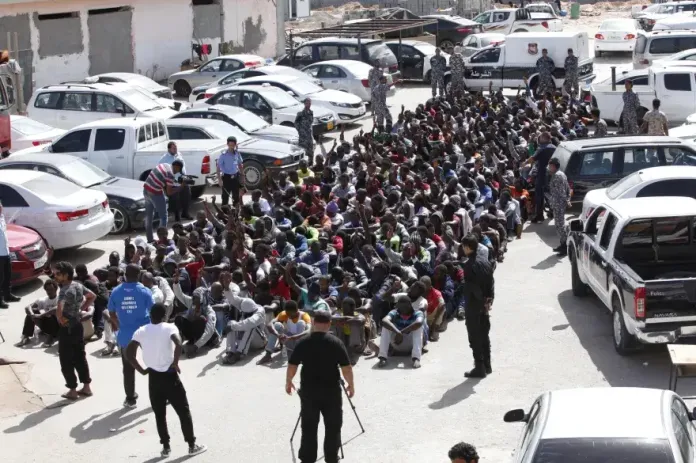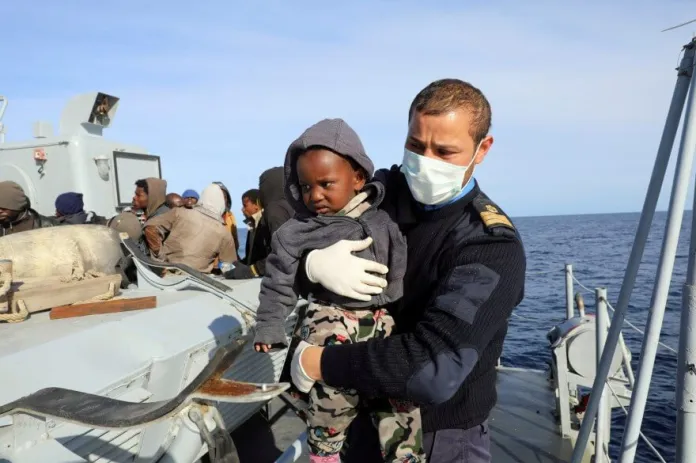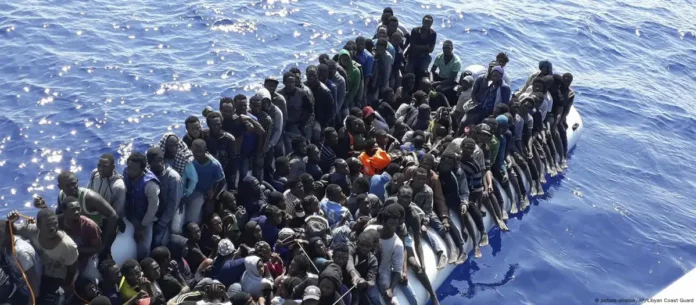More than 200,000 Sudanese men and women have sought refuge in Libya, fleeing the raging war in Sudan. The rights of these refugees in Libya are being subjected to serious violations. The United Nations warns that the failure to provide them with the necessary assistance may drive some to risk continuing their journey to Europe.
The United Nations High Commissioner for Refugees (UNHCR) has sounded the alarm about the human cost of the ongoing war in Sudan. Since the outbreak of war between the Sudanese army and the Rapid Support Forces in April 2023, about ten million people have been displaced within the country, and about two million people have managed to flee to neighboring countries. The situation of Sudanese in Libya appears to be the most critical among all neighboring countries. Therefore, many of them hope to continue their journey later towards Europe or Tunisia.
The number of Sudanese refugees, of both sexes, in Libya is estimated at about 210,000 people, according to UNHCR estimates issued in January 2025. They often arrive without any identification documents, which makes their presence illegal under Libyan legislation.
According to Omar (a pseudonym), a lawyer from a city in southern Libya, to SWI swissinfo.ch: “For this reason, refugees from Sudan are usually arrested upon arrival, then transferred to detention centers or police stations, where we, as lawyers, have to intervene.” According to UNHCR statistics in 2024, the number of asylum applications from them ranged between 400 and 500 applications per day, in the Kufra region in southeastern Libya alone.
It is worth mentioning that Omar, a member of the Libyan Network to Combat Torture, spoke to us on condition of anonymity, because Libyan laws criminalize the work of legal teams and non-governmental organizations if they provide assistance to refugees. In November 2024, his organization, based in Geneva, conducted an investigation in cooperation with the World Organization Against Torture. According to the report, refugees from Sudan in Libya are subjected to horrific human rights violations. Although international law guarantees protection for all those fleeing war, men and women, this group in Libya remains “vulnerable to arrest, arbitrary detention, exploitation, human trafficking, torture, ill-treatment, sexual violence, and racial discrimination.”
Libya is also suffering from an internal conflict. In 2011, a popular uprising, with the support of the North Atlantic Treaty Organization, led to the overthrow of President Muammar Gaddafi, who ruled the country for a long time. Since then, Libya has become a dangerous transit country for refugees and migrants. There are two governments operating in different regions of the country, in addition to many armed groups that control local areas of influence, creating an environment in which human rights are constantly violated.
Although Libya has not ratified the 1951 United Nations Convention relating to the Status of Refugees, it has approved a similar agreement within the bodies of the African Union. However, this has not prevented the authorities from detaining asylum seekers.
Detention

Omar, along with a group of lawyers in southern Libya, works to assist several hundred Sudanese refugees who are detained annually in police stations. His organization cooperates with lawyers throughout the country. Omar says: “Sometimes, we can pay the fine required under Libyan law to release the detainees. We succeed in releasing many of them if the police stations agree to refer their cases to the judiciary and begin legal procedures.” But if a refugee is transferred, after a long period of arbitrary detention without trial, to another location, follow-up becomes more difficult for the lawyers. Some refugees remain in detention for years without justification, even if the places of detention are known, and despite complaints being filed with the Public Prosecutor’s Office.
Refugees coming from Sudan to the south of the country, their first point of entry after fleeing, face additional challenges such as displacement, and exposure to theft and rape. Furthermore, many Sudanese children and young people are subjected to forced labor on farms. Omar expresses regret for the weak presence of the UNHCR and the International Organization for Migration in that region, and warns that children, in particular, are at extreme risk there, as several children died of starvation in September and October 2024.
In southern and eastern Libya, where an armed group called the Libyan Arab Armed Forces controls, Sudanese refugees also face the risk of being handed over to the Sudanese “Rapid Support Forces” militia, and forcibly returned to Sudan. Abdel Aziz Muhammad, a member of the Sudanese Diaspora Committee, who was met by Swiss Info in Geneva, confirms that dozens of Sudanese men have already been handed over to the Rapid Support Forces.
Continuing the journey towards Europe
In the north of the country, where a large number of refugees seek to leave the country, better care services are available. In the capital, Tripoli, arrivals can register as refugees with the United Nations High Commissioner for Refugees.
Although Libya is not a party to the United Nations Refugee Convention, they rely on registration to ensure some protection or an opportunity for resettlement in a third country. But in reality, very few of these are resettled; Even Germany, which is among the countries that receive the most refugees from Libya, has received only about 450 people.
However, large numbers of refugees do not stop at Libya, but continue the journey beyond its borders. According to the UNHCR, about 6,000 refugees from Sudan arrived in Italy via Tunisia and Libya between the beginning of 2023 and April 2024, about six times the number in the previous year. Many refugees who try to cross the Mediterranean Sea are intercepted by the Libyan coast guard and forcibly returned to Libya.
Filippo Grandi, the United Nations High Commissioner for Refugees, has repeatedly warned that refugees from Sudan may continue to head to Europe if they do not receive sufficient support from wealthy countries. Grandi told the UN Security Council at the end of May 2024: “Wealthy countries are constantly worried about what they call ‘irregular migration,’ but they are not doing enough to help people before they resort to human trafficking networks.”
In interviews conducted by the World Organization Against Torture and the Libyan Network to Combat Torture, most refugees from Sudan expressed a desire to settle in a safe country. The European Union has supported the Libyan Coast Guard with at least 59 million euros since 2017, and the support has included military boats, funds, and training programs, in order to prevent refugee and migrant groups from reaching Europe.
Muhammad, who works with the Libyan Network to Combat Torture in northwestern Libya, told Swiss Info in Geneva that refugees and migrants who are intercepted by the Libyan Coast Guard and forcibly returned to Libya face significant risks, and some may drown or be injured during the process. The survivors are then transferred to various detention facilities, where they are subjected to ill-treatment. Testimonies collected by activists from the Libyan Network to Combat Torture, as well as a fact-finding mission from the Human Rights Council in Geneva, confirmed these accounts. The investigations also reported evidence of cooperation between the coast guard in the north of the country and human smuggling networks. For a long time, the UNHCR and the International Organization for Migration have been calling for an end to the repatriation of refugees to Libya after the Coast Guard intercepts the boats carrying them, given the possibility of their exposure to arbitrary detention and ill-treatment there. At the request of the United Nations Human Rights Council, the Independent Fact-Finding Mission in Libya conducted an investigation, and its report issued in March 2023 concluded that there were reasonable grounds to believe that crimes against humanity had been committed against refugees and migrants in detention centers controlled by the Libyan authorities, including those run by the Coast Guard.
The Libyan Network to Combat Torture works to document such serious human rights violations and report them to international organizations such as the United Nations Support Mission in Libya and the UNHCR. Muhammad says that this is the only way that allows the network to exert pressure on the government. He adds: “We were able to close three detention centers.”
Muhammad indicates that the dignity of refugees and migrants is violated even after their death. He showed us pictures on his phone of the bodies of drowning victims, some of them decomposed, washed up on Libyan beaches. He says that these dead are buried in private cemeteries, often without identifying them.
No safe escape
As for the groups that try to cross into Europe, they are stopped by the border guards before being returned to Libya, where they are held in the Al-Assa center near the border. Muhammad estimates that about 700 people, male and female, are held in the Al-Assa center at any time. The World Organization Against Torture says that when the camp is overcrowded, the surplus is transferred to other detention facilities without registering their personal data. Muhammad says: “Many disappear here, while others die or are tortured in other facilities.”
In early February, two mass graves were discovered in the Libyan desert, east of the country. 19 bodies were found in the Jakhra area, about 400 kilometers south of Benghazi, while it is believed that there are up to 70 additional bodies in a second cemetery in the Kufra desert, southeast of the country. The circumstances of their deaths and their nationalities remain unknown. The discovery of the two cemeteries came after a police raid, during which hundreds of refugees and migrants were rescued from the hands of human smuggling networks. In March 2024, 65 bodies were found in a mass grave in the desert, southwest of Libya, near the Tunisian border.
The UNHCR said that it “continues to call for the provision of new opportunities that enable refugees and migrants to rebuild their lives, in addition to providing humanitarian assistance and ensuring access to basic services in Libya and along the migration routes, where criminal networks exploit vulnerable groups, by detaining their members to demand ransoms and exploit them.”


